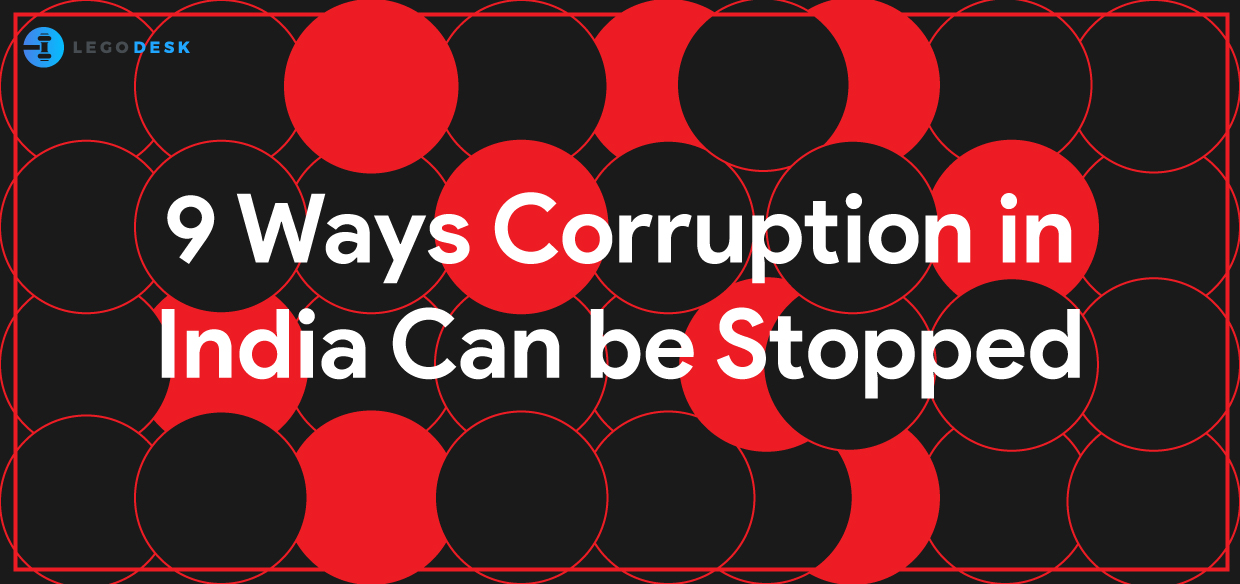What is corruption?
Corruption is a massive problem in India. It is a hurdle towards the effective functioning of a healthy democracy such as ours. India is ranked at 78th place out of 180 nations according to the Corruption Perceptions Index,2018, reported by Transparency International. The word corruption refers to destruction, degrading or spoiling the society or the country. Selfishness and greed are the main contributors. Lack of honesty and integrity is also reflected among corrupt people.
Ways To Stop Corruption in India
With so much corruption in our society, here are nine ways by which we or the concerned authorities can contribute to stopping the corruption in India –
- Leadership
Corruption is cancer, and it spreads very fast. Many new dynamic leaders consider the elimination of corruption as their primary duty, but they fall into the hatches of corruption due to greed and selfishness. Top leaders must set an example that to be successful in life honesty, integrity, and hard work is extremely important. However, honesty and motivated individuals alone cannot eradicate the problem. - Credibility
You can’t clap from just one hand, you need two hands. To counter the corrupt, the offenders on both sides of the demand and supply chain must be convinced that the government is serious about combating corruption. One suggestion towards the same is to “fry some big fish”, which means publicly try and punish some well-known corrupt people in our country. - Involvement of people
The Right to Information Act, 2005 empowers the citizens of India to ask for information related to the government, and the same must be made available to the public unless it is a confidential piece of information. Once people are convinced that there is a strong effort to protest against the corrupt officials, they will respond and extend their full participation in resolving this issue. It is only the people of India who can stop corruption in India! Hence, people’s involvement becomes inevitable. - Responsible Media
A Media which is responsible will gather, analyze, organize, present and disseminate information neutrally to create public awareness and help in undertaking reforms to overcome corruption. Nevertheless, its ability to garner political support and mislead the people should not be underestimated. - Watch-dog agencies
The watch-dog agencies such as the Central Vigilance Commission (CVC) is the governmental wing which addresses corruption in the government. It is an autonomous body. This body can only thrive only where the political atmosphere is filled with honest people, civil servants are free from governmental interference, and better incentives are given to discourage corruption. If not, bodies such as the CVC will be of no use or worse, misused for political gain. - Improving Institutions
Improvement of the legal framework speedy disposal of cases, less time-consuming ways to conduct business in the law courts and in the administration of justice, promotion of efficiency of the security forces such as the police, strengthening the auditor general’s office, appointment of a responsible inspector general who will be responsible for the investigation of corruption in India. - Revision of Laws
Existing laws relating to corruption must be modified and amended. Severe punishments and not just fine must be imposed on the perpetrator. - Education
Minimizing corruption is possible with the help of knowledge. According to a survey, Kerela is the least corrupt state in India because it has the highest literacy in India. - E-Governance
Corruption in India can be reduced by increasing the contact between the government and the governed. E-governance could help a lot in this regard. E-government refers to the communication between Government-to-business, Government-to-government, government-to-employees as well as the interaction between the entire governmental framework through information and communication technology (ICT). This will enable the important exchange of information, with the RTI also helping this process.
Further, here are the Indian laws that are working towards combating corruption –
- Prosecution section of Income Tax Act, 1961
- The Prevention of Corruption Act, 1988
- The Benami Transactions (Prohibition) Act, 1988 to prohibit Benami transactions.
- Prevention of Money Laundering Act, 2002
- Lokpal and Lokayukta Act, 2013
CONCLUSION
Corruption occurs not just in India but everywhere in the world, especially in places where the risk of getting caught is low and the rewards are high. It is not a matter of whether it is unlawful or illegal but a question of personal integrity and dignity. It is unethical to hoard money and gain an advantage by wrong-doings. It results in social inequality, widens the gap between the rich and the poor, makes the administration slow and makes the country shameful in the eyes of the world. It is important for the people of India to realize that what starts as greed and selfishness turns into corruption one day. Apart from the remedies suggested above, the mindset of the people has to change, and the people themselves can only do that. There is no medicine, no book that can teach the same to them. The root of greed and selfishness must be eradicated from their brains.


